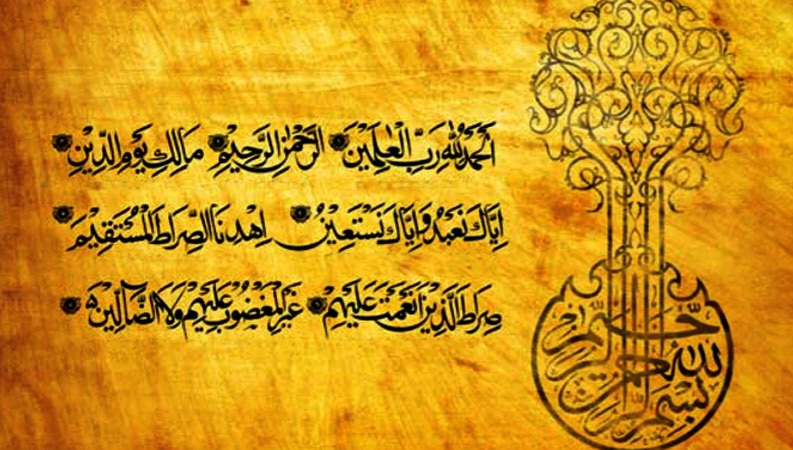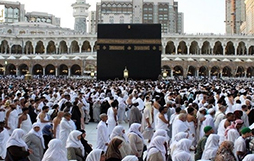The First Surah (Chapter) of the QuranUnderstanding the Meaning of Surah Fatihah
Md. Enamul H. Choudhury, FCA
Published: 2024-02-20 11:11:45 BdST | Updated: 2024-04-29 13:33:21 BdST
Introduction
Surah Al-Fatihah, the first chapter of the Quran, is also known as "The Opening" or "The Opener". This surah has profound and significant wisdom for those who read it with deep understanding. It reminds us Allah is the Lord of all worlds, His blessings and mercy upon mankind and that we will be held accountable for our deeds before Him. By following His guidance and leading a virtuous life, we can earn His grace. Any other path leads to misfortune. This surah encapsulates the essence of monotheism, devotion, and surrender to Allah (swt). Its powerful message calls us to live a life of righteousness and virtue and to essentially seek His guidance in all that we do. Let us reflect on its words and strive to live our lives by its teachings.
The Surah Al Fatihah is known by several names, such as "Fatihat al Kitab" (the opening of the divine writ), "Ummal Kitab" (the essence of the divine writ), "Surat al Hamd" (the surah of praise), and "Asas al Quran" (the foundation of the Quran). According to reliable traditions, this Surah was the first complete revelation to Prophet Mohammad (pbuh) in Makkah. However, a few verses of Surah Al-Alaq (96), Surah Al Muzzammil (73), and Surah Al-Qiyamah (75) were revealed before it. Prophet Mohammad (pbuh) himself referred to it as "Ummal Kitab" due to its concise expression of all the fundamental principles laid down in the Quran, such as the oneness or uniqueness of Allah, as well as His role as the creator, originator and sustainer of the universe. In this article, the meaning of each of the seven verses are elaborated for in-depth understanding.
The meaning of Surah Fatihah: seven ayats (verses)
1. Bismillahir Rahmanir Raheem (In the name of Allah, the Merciful, the Compassionate)
Here Allah (swt) teaches mankind that one is bound to pronounce the name of Allah at the beginning because Allah is Rahman: (which signifies the merciful, compassionate and more comprehensive grace) and Rahim (expresses the manifestation of his grace and its effect upon His creation.)
2. Al-hamdu lillahi Rabb il-'Alamin (All praises are due to Allah (swt) alone, as He is the creator, cherisher and sustainer of the Alamin: universe, galaxy, planets, stars, sun, moon, dark matters, electron, proton, hills, water, air, oceans, and all that exit on the earth and heaven)
In this verse, the word "Hamd '' which means praise, signifies the act of recognising, admiring, respecting, commending, and approving that Allah (swt) is the creator, cherisher, sustainer, and protector of His creation. We must express our gratitude and praise to Him for all His creation and sustenance. The act of praise is not limited to humans only; everything on earth and in the heavens glorifies and praises Allah (swt). It is striking that the very first verse of five other Surahs (Chapters) of the Al-Quran is similar to this: Saff 61:1, Al Jumu'ah 62:1, Tagabun 64:1, Al Hadid 57:1, and Hashar 59:1. The meaning of each of the verses is the same: all praise and gratitude to Allah (swt) for His magnificent creation:
“Whatever is in the heaven and whatever is on the earth, let it declare the praise and glorify of Allah: for He is the All-Mighty and the All-Wise”
Being the most exalted creation and appointed Khalifa (successor) of Allah (swt), mankind bears the noble responsibility of offering unceasing praise and glory to the divine creator Allah (swt). It is binding upon every individual to submit wholeheartedly to His authority, embrace the path of righteousness and abide by the guidance bound upon us by Allah (swt). Consequently, our reverence and adulation should be directed solely towards Him, for no other entity merits such admiration or adoration.
Allah (swt) says:
“Fabi Ayyi Ala-i-Rabbikuma Tukazziban” (Then which of the blessings of your Lord would you deny?)
The above verse from the Al-Quran is repeated thirty-one times in Surah Ar-Rahman reminding mankind to understand and recognise the blessings received from Allah (swt) and glorify Him by words and actions.
Further, Allah (swt) iterates in two verses about His infinite wisdom and knowledge which we should deeply postulate:
“And if all the trees on the earth were pens and the ocean (were ink wherewith to write), with seven oceans behind it to add to its (supply), yet the words of Allah would not be exhausted, Verily, Allah is All-Mighty, All-Wise.” Surah Luqman, 31:27
“Say (O Muhammad to mankind): “If the ocean were ink for (writing) the words of my Sustainer’s (Lord), surely, the ocean would be indeed exhausted before the words of my Sustainer would be exhausted, even if we brought (another sea) like it for its aid.
Surah Al-Kahf 18:109
The phrase “Words of Allah” means: His wonderful signs and commandments are infinite and cannot be expressed even if all the trees were made into pens and all the oceans multiplied seven times were made into ink. Nor would any praise that we could write with infinite resources adequately describe His power, glory, and wisdom.
In this verse, the word "Rabb" is a unique term that doesn't have a direct translation in English or other languages. The closest English equivalent is "Lord". However, "Rabb" has a broader meaning that encompasses the oneness of Allah, who is the creator, owner, organizer, planner, sustainer, ruler, controller and provider of security for everything in both heaven and earth.
3. Ar-Rahman Ar-Raheem (The Most Gracious, the most Merciful) The words Ar-Rahman and Ar-Raheem are both intensive forms of referring to Allah's attribute of Mercy.
4. Maliki yawmi-d-Din (Master of the Day of Judgement, the day of recompense, the day of resurrection, the day of gathering, the day of decision, the day of sorting out, the day of grief and regrets, the day of reward)
5. Iyya-ka na'budu (our Ibadah, i.e. our submission and obedience is to only for Allah (swt))
Wa iyya-ka nasta'in (And You (alone) we ask for help for each and everything) We know that He is the Lord of the universe and He is the Master of all blessings. Hence, we seek the fulfillment of our needs and turn to him alone.
6. Ihdina-Sirat al-Mustaqim (Guide us to and in the straight way (true guidance))
According to the “Quran”, the guidance for mankind is from Allah (swt). In the second verse of Surah Al-Baqarah, Allah (swt) says:
“Jalekal Ketabu Lariba Fihe Hudalill Muttakin” (This is the Book (the Quran), about which there is no doubt and guidance (Huda) to those who are Muttakin, conscious of Allah)
The words “Huda” and “Muttakin” complement each other. “Huda” means “Way of life according to the Islamic Monotheism” and if the believers follow “Huda”, they will be “Muttakin”.
“Sirat-al-Mustaqim” (straight way/righteous way) is also found in seven Surahs (Chapters) in the Quran: Aya No 6 of Surah Fatihah, Aya No. 36 of Surah Maryam, Aya No. 4 of Surah Ya-sin, Aya No. 73 of Surah Muminun, Aya No. 46 of Surah Noor, Aya No. 02 of Surah Fatha and Aya No 52 of Surah Ashshura.
Siratul Mustaquin is the absolute way for mankind that will lead us to true salvation and happiness. Other ways only lead to destruction in this life and hereafter. It is the only right philosophy for human life to stay on the true path. It answers the question of where mankind has come from and what will be the ultimate destination of human life. Islam is the only true path for mankind that will save one from misfortune.
7. Sirat al-ladhina an'amta 'alai-him (The way of those on whom You have bestowed (respected) Your grace (e.i. those who believe in the oneness of Allah (swt), His Messengers, previous scriptures and the final revelation, the Quran, revealed to Prophet Mohammad (pbuh) and follow the path of righteousness will be in the company of those on whom Allah (swt) has bestowed His grace)
Surah An-Nisa No.4, verse 69 has introduced these people, thus:
“And whoever obeys Allah and the Messengers, then they will be in the company of those on whom Allah has bestowed His Grace, of the Prophets, the Siddiqun (those who never deviated from the truth) and Shuhada (martyrs-those who with their lives bore witness to the truth), and the righteous. And how excellent these companions are!”
Ghair il-maghdubi deed 'alai-him wa la-d-dallin (Not the way of those who earned your anger nor of those who went astray (to become lost)
In this verse of the Quran, Allah (swt) warns that anyone who deviates from the straight path will incur His wrath and suffer in misery. The following verse makes it clear that those who ignore this warning will face a disastrous end in the hereafter.
“And that He may punish the Munafiqun (hypocrites) men and women, and also the Mushrikun (polytheists, pagans, idolaters, atheists, materialists, and those who associate others in His Divinity and disbelieves of the oneness of Allah and His Messengers) men and women, who think evil thoughts about Allah: for them is a disgraceful torment. And the Anger of Allah is upon them and He has cursed them and prepared Hell for them and worst indeed is that destination.” Surah Al-Fath 48:6
Conclusion
Surah Fatihah serves as more than just the opening chapter of the Quran. It holds a deep significance that every believer should understand regarding the purpose of our lives. The meaning of the word "Rabb" attributed to Allah (swt) should be properly comprehended in our lives. Allah is our Rabb, and besides praising His mercy and bounty, we must actively seek His guidance to remain on the path of righteousness and virtue. Ultimately, we will be held accountable to Him for our deeds at the end of our lives.
The path of Islam, also known as Siratul Mustaquin or the Straight Way, is the only way to attain true salvation, peace, and happiness for humanity. Islam is considered to be the only genuine philosophy for human life and the only way of living life as desired by Allah (swt).
It is essential to understand that Islam encompasses all aspects of life, ranging from personal and social life to family affairs, cultural, socio-political, economic and other systems related to human beings.
সকল প্রকাশিত/প্রচারিত কোনো সংবাদ, তথ্য, ছবি, আলোকচিত্র, রেখাচিত্র, ভিডিওচিত্র, অডিও কনটেন্ট কপিরাইট আইনে পূর্বানুমতি ছাড়া ব্যবহার করা যাবে না।






আপনার মূল্যবান মতামত দিন: